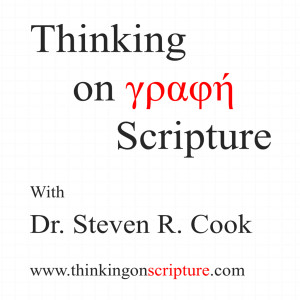
Thinking on Scripture with Dr. Steven R. Cook
Religion & Spirituality:Christianity

The primary point of this pericope is that God will judge His people in order to purify them for future service. The pericope opens with anthropomorphic language in which God tells His people they had wearied Him with their words. In incredulity, they asked, “How have we wearied Him?” What they were saying was, “Everyone who does evil is good in the sight of the LORD, and He delights in them,” or, “Where is the God of justice?” (Mal 2:17). Apparently, some assumed God was approving of evil, while others thought He simply did not care about justice. Of course, God cares about justice. He is righteous in character and just in all His ways. God does show grace to the wicked (Matt 5:45; Acts 14:17), that they might have time to respond to Him in faith and be saved; for God “is patient toward you, not wishing for any to perish but for all to come to repentance” (2 Pet 3:9); and the righteous are, at times, permitted to suffer (Job 1:1-21; 2:9-10; 2 Tim 3:12). But God will judge the wicked; if not in this life, then the next (Rev 20:11-15).The Lord responded to their comments by pointing them to the future; specifically, the time when He would send His messenger, saying, “Behold, I am going to send My messenger, and he will clear the way before Me” (Mal 3:1a). We know from the NT that this messenger is John the Baptist (Matt 11:10, 14; 17:11-12), who prepared the way for Messiah (cf. Isa 40:3-5). Then the Lord says, “And the Lord, whom you seek, will suddenly come to His temple; and the messenger of the covenant, in whom you delight, behold, He is coming” (Mal 3:1b). This refers to Jesus, the Messiah. “From the historical perspective, since this is an oracle about John the Baptist preparing people for Jesus the Messiah, then the covenant must be the new covenant that Christ inaugurated in the upper room and sealed with his blood at the cross.”[1] Jesus’ first coming is only a partial fulfillment of this prophecy, which will be completed at His second coming, when He will judge the world and establish His kingdom on earth. Malachi then states, “But who can endure the day of His coming? And who can stand when He appears? For He is like a refiner’s fire and like fullers’ soap” (Mal 3:2). Jesus will come after the time of the Tribulation, and will judge His people in order to remove their impurities, (Mal 3:2b). God “will sit as a smelter and purifier of silver, and He will purify the sons of Levi and refine them like gold and silver” (Mal 3:3a). The Levites in Malachi’s day were not leading worship as they should, and were under God’s judgment. In the future, when Christ sets up His kingdom on earth, the Levites will again serve in the temple. However, at that time, they will be refined and cleansed by the Lord, “so that they may present to the LORD offerings in righteousness” (Mal 3:3b). That future generation of priests will offer as the Lord prescribes, saying, “Then the offering of Judah and Jerusalem will be pleasing to the LORD as in the days of old and as in former years” (Mal 3:4). Furthermore, in that day, God will judge all Israel, not just the Levites, and He will judge them for their many sins, saying, “Then I will draw near to you for judgment; and I will be a swift witness against the sorcerers and against the adulterers and against those who swear falsely, and against those who oppress the wage earner in his wages, the widow and the orphan, and those who turn aside the alien and do not fear Me” (Mal 3:5). God will judge sorcerers who seek to know the future by magical means, adulterers who are unfaithful in marriage, and those who corrupt justice by giving false testimony (Mal 3:5a). He will also judge those who oppress, either actively or passively, the most vulnerable in society, which include the common laborer, the widow and orphan, and the transient traveler passing through the land (Mal 3:5b). God’s people could know His promises were true, for they rested on His unchangeable nature, as He tells them, “For I, the LORD, do not change; therefore you, O sons of Jacob, are not consumed” (Mal 3:6). When God says He “does not change” (Mal 3:6a), He is speaking of His nature, not the course of action He may take with His people. We must remember that Israel was locked into a bilateral covenant—the Mosaic covenant—which made blessing or cursing dependent of their obedience or disobedience (see Deut 28:1-68). The Mosaic covenant was itself tied to a unilateral covenant—the Abrahamic covenant—which guaranteed Israel’s future preservation (Gen 12:1-3). God, who does not change, was faithful to purify His people in the furnace of affliction, while keeping His hand on the thermostat, so that they were not totally destroyed.
[1] Allen P. Ross, Malachi Then and Now: An Expository Commentary Based on Detailed Exegetical Analysis (Bellingham, WA: Lexham Press, 2016), 135.
More Episodes
 2023-04-02
2023-04-02
 57
57
 2023-04-01
2023-04-01
 70
70
 2023-03-06
2023-03-06
 68
68
 2023-03-05
2023-03-05
 53
53
Create your
podcast in
minutes
- Full-featured podcast site
- Unlimited storage and bandwidth
- Comprehensive podcast stats
- Distribute to Apple Podcasts, Spotify, and more
- Make money with your podcast
It is Free
- Privacy Policy
- Cookie Policy
- Terms of Use
- Consent Preferences
- Copyright © 2015-2024 Podbean.com





